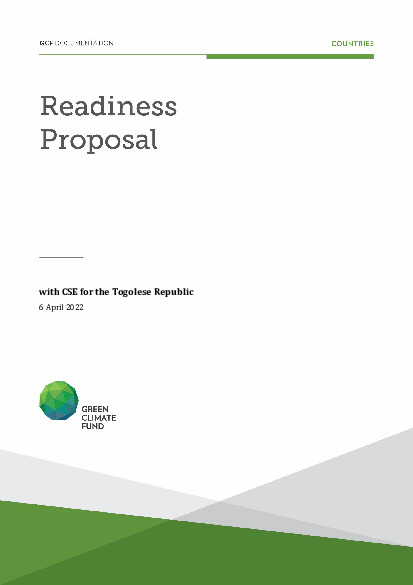Strengthening the NDA’s climate change governance structure to increase the level of ambition of the climate change agenda and enhance access to climate finance

Strengthening the NDA’s climate change governance structure to increase the level of ambition of the climate change agenda and enhance access to climate finance
Although it maintains a minor greenhouse emission profile, Togo is considered among the most vulnerable to climatic consequences.
While taking steps towards long-term low-carbon development, Togo faces several gaps in its technical competencies, institutional capacities, lack of expertise and coordination systems on climate change adaptation. Even though the NDA Focal Point (FP) has been nominated, it does not have a team with the necessary capacity to regularly engage with the GCF. The country's stakeholders cannot single-handedly prepare readiness proposals or CNs. Hence, they are constantly in need of technical assistance, especially at this stage. As a result, no single national funding proposal has been approved, nor can the country select an accredited national direct access entity.
Furthermore, it is difficult for the country to (i) ensure high quality and consistent climate change reporting; (ii) set an institutional framework to ensure effective and efficient governance and continuous monitoring of climatic interventions; (iii) build long-term institutional capacity, (iv) reduce dependency on external and short-term expertise over time; (v) design effective investment frameworks to support the climate change transformation agenda; (vi) have a capacity building and retention framework that can improve stakeholders' technical capacity to design and implement complex climate change interventions; (vii) A solid institutional framework capable of ensuring efficient and effective governance. Should Togo obtain the previous capacities, frameworks, and competencies, it will enhance its access to climate finance and implement concrete climate actions. In addition, the technical assessment undertaken for West African countries as part of the determination of the needs of developing country Parties related to the implementation of the Convention and the Paris Agreement report presents Togo as the second country with the lowest amounts of annual climate finance flow estimated at USD 26 million on average between 2013-2018. The situation has not changed much over the past three years.
Due to these challenges, the country's ability to respond to climate change priorities has long been compromised to the extent that it has been limited to respond to climate change mostly by fulfilling its reporting commitments. Therefore, it is necessary and urgent for Togo to adopt a new paradigm.
This Readiness aims to achieve the objective I, II and V of GCF' Readiness Programme. It will implement a strategy focused on knowledge and experience sharing and consolidate the NDA's and relevant institutions' efforts to build long- term country capacity and ensure joint, effective, and coherent climate governance.
The beneficiaries of this Readiness are as follows:
- The NDA;
- Other line Ministries: Ministry of Road, Air and Rail Transport, Ministry of Water and Village Hydraulic, Ministry of Economy and Finance, Ministry of Agriculture, Livestock and Rural Development, Ministry of Maritime Economy, Fisheries and Coastal Protection, Ministry of Social Action, Promotion of Women and Literacy, Ministry of Urbanism, Housing and Land Reform and Minister in charge of Energy and Mines;
- National Committee for the Green Climate Fund of Togo (NC-GCF);
- The National Climate Change Committee;
- The Technical Expert Working Groups of the National Communication and Biennial Update Report;
- Other relevant Stakeholders: Civil Society Organizations (JVE, OPED, SSA), Private Sector, Academic Institutions (the University of Lomé and the University of Kara).